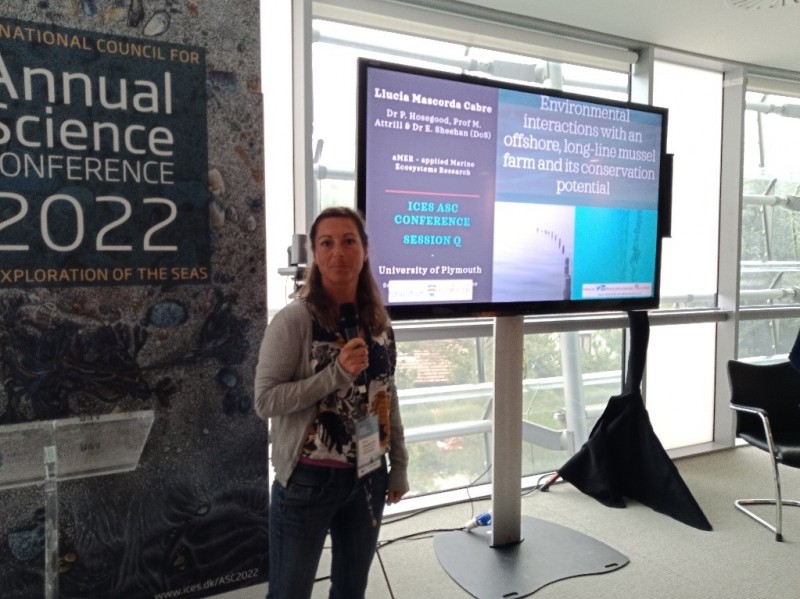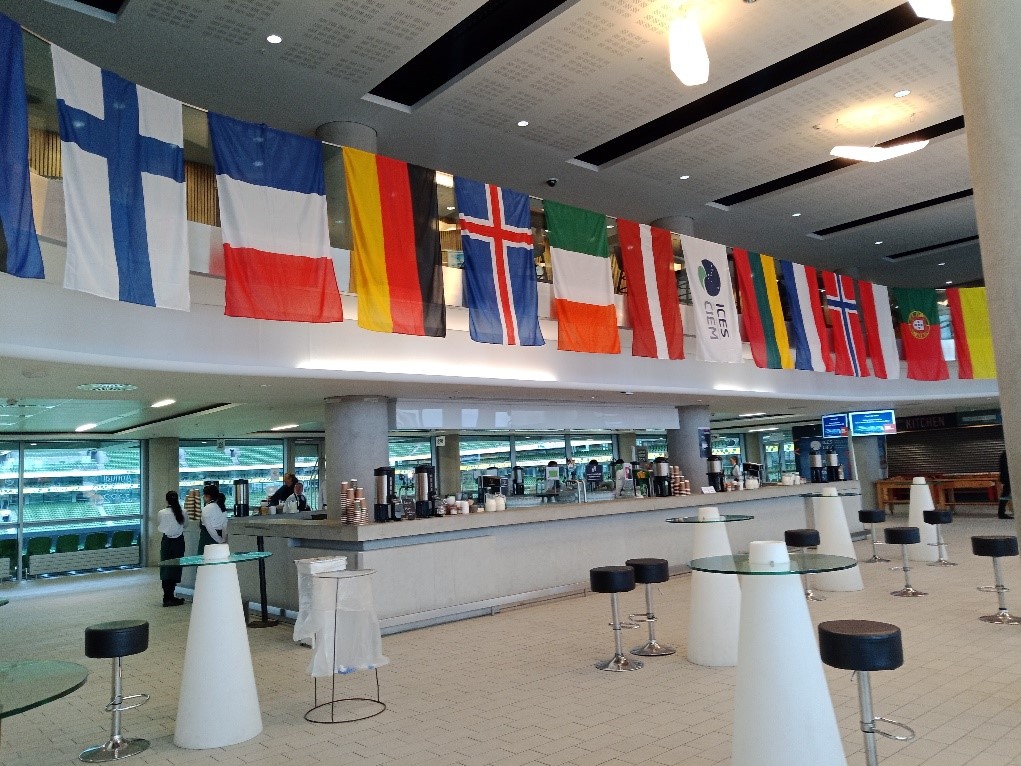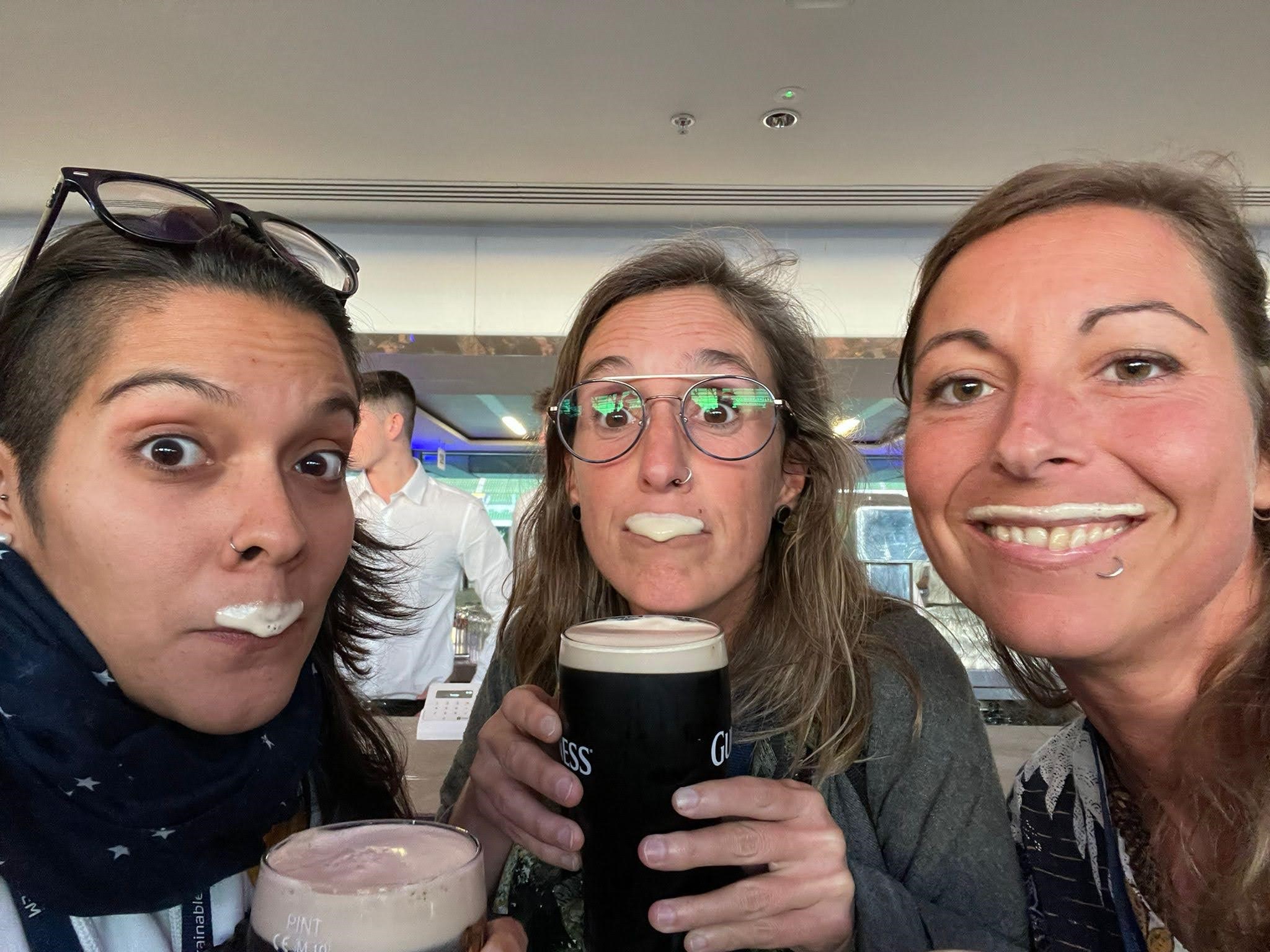ICES ASC 2022 Conference
Llucia Mascorda-Cabre
University of Plymouth

Caption: My presentation as part of Session Q
On 19th - 22nd September 2022 it was the first in person International Council for the Exploration of the Seas Annual Science Conference (ICES ASC) since Covid. It was a hybrid conference but for me it was crucial to be able to attend in person as due to Covid I hadn’t been able to participate in conferences in person and I was eager to present my work and meet a lot of early career researchers (ECR) and prominent scientist in the field.

Caption: Entrance to ICES ASC Conference at the Aviva Stadium, Dublin and the conference main hall on the first day of the conference. Very early morning – calm before the storm
This year’s ICES ASC was hosted in Dublin, Ireland, at one of the most iconic stadiums in the country, the rugby Aviva Arena. The conference had a wide range of theme sessions and it was packed with activities for ECRs. I wanted to participate on this conference due to the importance that participating on an ICES conference means as an early career scientist. My career focus and goals are all centered on my interest in marine conservation and the sustainable use of our oceans with a great interest in working towards meeting the UN Sustainable Development Goals (SDGs) with a keen interest in fisheries & aquaculture management which are fundamental to ICES. My PhD entitled ‘Oceanographic and Ecological interaction with an offshore longline mussel farm’ has the SDGs, Aichi Targets and Blue Growth at its core. This project aims to provide a comprehensive understanding into the sustainability of growing shellfish offshore by looking at the ecological and oceanographic effects of Europe’s largest offshore mussel farm, its potential to be a climate change positive industry and one of the most sustainable sources of protein.
Caption: I met another ECR from the University of Plymouth
This is my first time attending an ICES event and I was incredibly excited and honoured to present at two Sessions; Session B - Spatial management, climate change and biodiversity, and Session Q - Sustainable aquaculture in a changing world. In Session B, I presented the outcomes of a workshop I participated in last year. The aquaculture site my PhD is monitoring was chosen to be used to assess the guidance on OECMs as part of a joint ICES/IUCN-CEM FEG Workshop on Testing OECM Practices and Strategies (WORKTOPS). In Session Q, I presented some of the results from my PhD project showing the impacts that offshore aquaculture have on its surrounding environment.
Caption: Participating in one of the many workshops
This was a superb opportunity for me to present and showcase my work amongst some of the best fisheries and aquaculture scientists as well as to meet and network with other early career scientists. As a fourth year PhD candidate in Marine Science, I believe that my professional and personal development highly benefited from this opportunity. I met and made new friends and I was able to make contact with ICES group chairs and I am now very excited to be able to participate on a workshop on aquaculture. 

Caption: Very exciting conference dinner and award night at the home of Guinness
I am very grateful to the Challenger Society for the Travel Award that supported my attendance and participation at the ICES ASC 2022. The opportunity to finally attend an in-person conference was an incredible experience and an amazing platform to network. I believe that my professional and personal development have highly benefited from this opportunity, thank you!

Caption: Making the most of the best Guinness with new friends and a goodbye picture with some of the ECRs I have met
Profile
I am a marine ecology, oceanography and conservation researcher with 10 years’ experience in collecting and interpreting measurements from a diverse range of dynamic regimes in the terrestrial, coastal and marine environment. At the beginning of my career I worked as a science officer for two NGOs in Madagascar and as a terrestrial ecological surveyor for an ecological consultancy before embarking on a three year post as a Marine Lead Adviser for Natural England (NE). Based in the South West of England, I worked on the designation of new Marine Protected Areas (MPAs) and new Conservation Advice packages as well as leading on stakeholder engagement programs as the Exe Estuary MPA site lead. In 2016, I started an Erasmus Mundus MSc, which took me to four different Universities in four different countries (France, Spain, Belgium and Australia) achieving a Master (cum laude) with the best mark of my cohort, being awarded with a price for my accomplishment. I performed my master thesis under the supervision of Professor Graham Edgar from the University of Tasmania (IMAS). In 2019, I started a new chapter on my scientific career as a PhD student as part of Dr Emma Sheehan’s research group at the University of Plymouth. During this 4 year PhD, I have been studying the ecological and oceanographic environmental interactions of a novel large-scale offshore mussel farm in Lyme Bay, UK. Both my academic and professional experience have always involved a multidisciplinary and holistic approach to marine conservation and resource management, and this project is a great opportunity to build on this by studying and understanding the links between biodiversity and its function within the ecosystem.
Profile links:
https://www.plymouth.ac.uk/staff/llucia-mascorda-cabre
https://www.linkedin.com/in/llucia-mascorda-cabre-96011962/
Twitter: @LluciaMascorda
Instagram: @lluciamc
https://www.researchgate.net/profile/Llucia-Mascorda-Cabre
Latest News
Marine Data Management, Governance and the MEDIN toolset
The Marine Environmental Data and Information Network (MEDIN) and OceanWise are delighted to invite you to attend our popular free online training workshop: ‘Marine Data Management, Governance and the MEDIN toolset’ on the 19th – 23rd of May 2025.
Workshop on the contribution of UK Arctic Ocean science to the International Polar Year 32/33
12:00 11th June – 16:00 12th June 2025: NOC Southampton (In-person with online option): Registration deadline 16th May
REGISTER HERE
Pre-meeting questionnaire (open to all)
The purpose of this workshop is for the UK Ocean Science community to discuss and then draft a prospectus document outlining the priority Arctic research questions the community would like to address during the run up to, throughout and beyond the International Polar Year 32/33. Additionally, to identify what unique strengths and technologies the UK has to help fill these knowledge gaps.
The second day of the workshop will be dedicated to writing groups, one for each of the priority research questions identified - from both the pre-meeting questionnaire (HERE) and day one discussion. By the end of the meeting, each group will have produced draft text and sourced supporting figures for the prospectus.
Post meeting, the draft will be opened for comments and suggestions from everyone, regardless of whether they were able to attend the workshop or not. It will then be shared with UK funders (UKRI, FCDO, DSIT, ARIA) and potential international programmes with whom we would like to collaborate (e.g. Arctic 2050, Norway). It will form a basis from which wider integration with terrestrial, atmospheric and cryosphere communities can be built, e.g. at the UK Arctic Science Meeting in September in Northumbria.
To ensure balanced community and ECR representation, and to ensure that the size of the writing groups is efficient and effective, if the number of registrations from individual institutes becomes overwhelming, we may contact individuals or teams and ask that each institute selects a smaller number of individuals to attend in-person. Please wait for confirmation of in-person attendance before finalising travel arrangements.
The workshop will be open to hybrid attendance and contributions on both days.
Challenger Society Council Position Vacancy
The Challenger Society for Marine Science (CSMS) are pleased to announce an exciting opportunity to support the next generation of ocean scientists and innovators. CSMS are looking for a new Council member to fill the Student Travel Awards and Stepping Stones Portfolio. The successful applicant will administer the travel and research grants available for Early Career Researchers.
The role involves:
- Receiving applications for the two schemes and responding to applicant inquiries
- Soliciting and compiling input from the rest of the Council for assessing the applications
- Communicating with successful and unsuccessful applicants for the two schemes
- Working with the Honorary Treasurer on allocating funds to successful applicants
- Following up with award winners on their reporting requirements
- Attending Council meetings four times a year (in person or online) and contributing to discussions and decision making for CSMS
The usual term for Council members is three years.
For more information about the CSMS Council, please follow this link: https://www.challenger-society.org.uk/The_Council
For more information about our Early Career Researcher grants and awards, please follow this link:
https://www.challenger-society.org.uk/Stepping_Stones
and
https://www.challenger-society.org.uk/Travel_awards
If you are interested in applying or have any questions regarding the role, please contact kathen@bas.ac.uk
